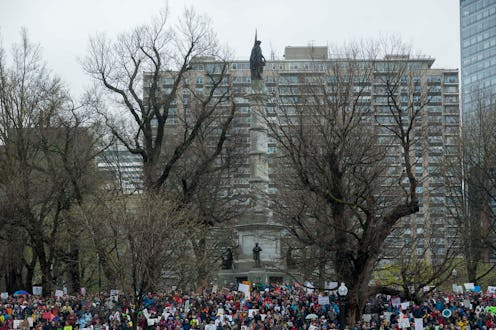News
There Was No Boston Free Speech Rally — Just Thousands Of People Standing Up To Racism

The city of Boston braced for impact on Saturday: The Boston Free Speech Rally was set to take place in Boston Common. After the entire nation watched in horror as a neo-Nazis march in Charlottesville last weekend erupted in violence, leading to the death of counter-protestor Heather Hayer and injuries to dozens of others, there was fear that the same would happen again in Boston. Large counter-protests and marches were organized, with a plan of keeping the Free Speech Rally in check. But they did far more than that. The counter-protestors far overwhelmed the Free Speech Rally.
If you weren't reading the news, and walked out into the streets of Boston on Saturday, you would probably have no idea there even was a rally connected to the alt-right. The city was overwhelmed by the force of tens of thousands rallying for minority and immigrant rights, while the several dozen rallying for the right to speak out against those rights couldn't even overwhelm the bandstand in the Boston Common. If you looked at Beantown from space, you might imagine that there was a massive rally in support of pluralism and diversity planned, with a few counter-protesters wearing red MAGA hats peppered in.
Since the election of Donald Trump, there has been a debate among those who oppose him of how best to resist the rise of hate groups at the same time. Groups like Antifa have argued that, with the government in control of a man who seemingly feels no need to denounce white supremacists beyond political expediency, there is no longer any choice but to resort to violence to beat back the growth of racist and reactionary ideologies. "Punch Nazis" became a rallying cry for many horrified by the rise of hate groups and ideology.
But the events in Boston this weekend may point to a different conclusion. The march down Tremont Street and the demonstrations in the Boston Common were overwhelmingly peaceful, with activists going out of their way to shut down instances that might have led to violence. And with the Boston Free Speech Rally fizzling out barely after it started, it seems like they were successful anyway.
Political scientists who have studied resistance movements have found a much higher success rate for nonviolent movements than political action that turns violent, not only within democracies, but even in the most oppressive autocratic regimes. This is because nonviolent movements have a much easier time expanding their numbers and therefore their reach—people are much more willing to join or sympathize with a group that is acting nonviolently.
According to Erica Chenoweth, a professor at the University of Denver who studies nonviolent movements (who I spoke with in February), once nonviolent movements get big enough, even their opponents have a harder time fighting back, since large movements pervade all parts of society—police don't like to fire into a crowd with their neighbors in it, and ordinary people on the fence may be sympathetic if they do. Conversely, even moderates may cheer a crackdown on a violent group seen as a threat to public safety.
If you look at the reaction, among the hard-right and even all the way up to the president, to the events in Charlottesville, you can see this in action. There was some violent reaction from counter-protestors. Not an equivalent amount, in morality, in intention, or in effect, but yes, there was some, and that was the aspect of the horror that led the U.S. President to blame both sides.
It wasn't fair of the president to do so. I found it abhorrent. But it's a real issue that people fighting back against hate have to reckon with. The president called the people protesting Nazis violent, and that's enough to stop some people who might otherwise have joined in protesting Nazis from opposing them.
Just look at how some on Twitter have jumped on one isolated incident of violence at the Boston rally, shared by Fox News, to denounce the whole solidarity rally as violent and hateful:
I am not so naive as to imagine that if only the counter-protestors in Charlottesville were completely nonviolent, the horror we all witnessed would never have happened. The white nationalists and Nazis who came to rally around Robert E. Lee's statue came armed, so much so that Virginia's governor said police were afraid to confront them. A man with a car drove into a crowd. Chris Cantwell, one of the leaders of the Unite The Right rally, called Heather Hayer's murder "justified."
No one should imagine that if we just hold hands and chant hymns, the violence and hate that threaten America will wash away. And there are differences between how Charlottesville, a town of 47,000 people in a conservative part of Virginia, can react compared to the progressive city of 670,000 that is Boston, Massachusetts.
But the way that Boston's solidarity rally negated any impact of the rally by alt-right figures suggests what success in a non-violent anti-hate movement could look like, and what organizers should strive for in fighting back against the rise of white nationalism. What's the point of punching Nazis when you can make them irrelevant?